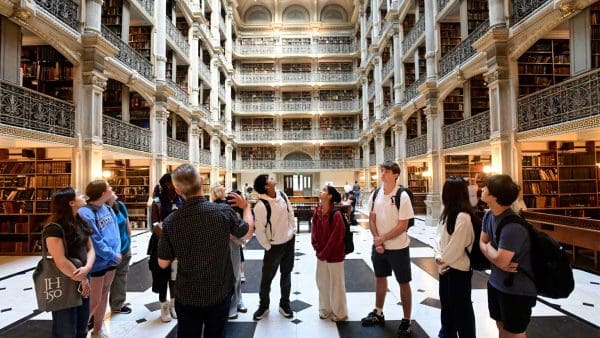Tierra Langley ’15 is keeping a journal where she reflects on the minutiae of her daily life. She notes her interactions with the family members who share her home and what she makes for dinner. She documents the challenges of stretching a budget that has no room for extras, and of being an African-American in an industrial city and a displaced Southerner in an unfamiliar northern state, an early refugee from North Carolina before the rush of the Great Migration.
That the journal is fictional, written from the perspective of a grandmother in the early 20th century, makes it no less of a powerful learning exercise for Langley and the other students in Katrina Bell McDonald’s course—The African-American Family. By the end of the semester, these initial observations and musings, combined with reflections on class readings and lectures, personal experience and discussion, film and literature, will result in the Black Family Saga, a narrative each student writes based on the life of a fictional character who exists within a larger fictional family.
“The first time I assigned it, students kind of looked at me like, ‘What?’” says McDonald, an associate professor in the Department of Sociology. “But when they got to the end, they said, ‘This is so amazing to be able to think this through.’ [That’s why] I keep doing it.”
McDonald had already taught a version of The African-American Family several times before joining the Johns Hopkins faculty in 1994, and has taught it about every two years since. Although there have been small changes to the class (mostly to the reading list as new research emerges), the goal of the course remains constant. “I really want students to have accurate information about what’s going on with black families,” says McDonald. “I want to help them understand or at least question the role of Africa in the lives of African-Americans. I want them to get the story of slavery right.”
Although the syllabus for the course includes literature and lectures covering a broad range of key concepts that affect black families, the dynamics of black marriage and child-rearing—areas that McDonald designates as “Black Intimacies”—are historically the students’ favorite topic of discussion, she says. “Many of the students will say that they were surprised to find that there were so many things that they didn’t know,” says McDonald. “It’s information they think they can use in the true sense as an African-American—because most of the students are African-American—and that they really take this information in as applicable to their own lives.”
That all students, not just those who are African-American, make personal connections to the material is a given for McDonald, who often shares stories of her own family when relevant. “Particularly in social science, that’s the way it all makes sense,” explains McDonald. “You get a mass of data—census data, ethnographic data—the relevance comes in when you see a link somewhere.”
The Black Family Saga project, in particular, enables students to walk a mile in another person’s shoes by entering the world of an African-American family on a personal level. It also prompts them to make sense of what they have read and observed. Early in the semester, small groups of students meet to create their fictional families, deciding kinship roles, negotiating their family’s historical period, geographic location, social class, and related demographics, and together making decisions about their family’s trajectory based on class readings and lectures. Each student then writes his or her own narrative based on the perspective of the family member the student has created. “It’s a really interesting approach that gives us the ability to submerge ourselves in an African-American family to gain perspective of what it’s like,” says sociology major Rafee Al-Mansur ’13. “Playing the role makes you think about different dynamics from a different perspective.”
Students also credit McDonald’s class with giving them a broader historical perspective and helping them find their place within it. While Tierra Langley characterizes the Black Family Saga project as “unique” (and fun, too, she says), she has been moved most by the multilayered analyses of the past. “The African-American family is a lot more complex than I ever expected,” says Langley, who is a double major in public health and Africana studies. “So much of the history is just sad and awful and at the same time, people prevailed and were strong.
“Professor McDonald has said this several times, but it’s just sinking in, that the African-American family has survived despite slavery, despite Jim Crow,” she continues. “The full weight of the past is just shocking to me.” While McDonald acknowledges that students can get depressed by the accounts of systematic mistreatment and racism they read, she also sees the course as empowering—whether it be the gateway to an honor’s thesis and future research or a better understanding of where their own family fits into the larger community. “At the end of it all,” says McDonald, “I learn about the students’ yearnings. I learn about what really matters to them in this material.”




